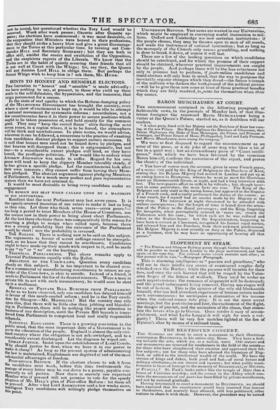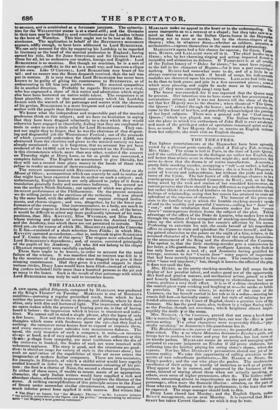THE BEETHOVEN CONCERT.
THF. Germans are about to erect a monument to their illustrious countryman BEETHOVEN, in his native city, Bonn. They have a feel- ing towards the arts, which we, as a nation, want. Our statues and our monuments are reserved for combatants in the field or the senate— for those who have slaughtered their enemies and oppressed their fel- low subjects ; not for those who have adorned the literature of Eng- land, or added to the intellectual wealth of the world. We have the statues of kings and dukes, both good and bad—of naval heroes and military chieftains—in our streets and squares ; but what public mani- festation is there of homage to the memory of SHAKSPEARE, or MILTON, or Pulicw.? St. Paul's looks rather like the temple of Mars than a house of Christian worship ; and the corner in the Abbey which con- tains the monuments of our poets has been filled by private munificence, and not by national gratitude. Having determined to erect a monument to BEETHOVEN, we should have expected that his countrymen would have reserved that honour to themselves, and scarcely have allowed, still less petitioned, other nations to share it with them. However, the precedent may be turned to account, and is established at a fortunate juncture. The subscrip- tion for the WELLINGTON statue is at a stand-still ; and the Germans in their turn may be invited to send contributions to the London tribute to the hero of Waterloo. This hint ought not to be lost at the Man- sionbouse. The application in behalf of the BEETHOVEN monument appears, oddly enough, to have been addressed to Lord BURGHEteSH. We can only account for this by supposing his Lordship to be regarded in Germany as the head of the musical profession in England ; having earned his title, like Sir JOHN STEVENSON and Sir GEORGE SMART.
Once for all, let us undeceive our readers, foreign and English : Lord BURGHERSH i8 no musician. But though no musician, he is a sort of
music-monger—trafficks in the art in a small way, and has even a clique
of his own. Like O'CONNELL, Lord BURGHERSH may boast of his mil: and no sooner was the Bonn despatch received, than the tail was
put in motion. It is very true that Lord BURGHERSH has never been known to be guilty of giving his countenance to BEETHOVEN, or of endeavouring to lift him into public notice. His musical sympathies lie in another direction. Probably he regards BEETHOVEN as a rival, who has engrossed a share of that notice and admiration which might else have been bestowed on native noble talent. The conjecture is at least plausible, since in that musical seminary which his Lordship fosters with the warmth of his patronage and waters with the showers of his genius, BURGHERSH is a more frequent and (of course) favourite author with the pupils than BEETHOVEN.
We know what the independent and respectable part of the musical profession think on this subject ; and we have no hesitation in saying
that they have been dragged reluctantly to a duty which they would otherwise have engaged in cheerfully, feeling that they are employed as tools in order to earn a little eclat for Lord BURGHERSH. They can- not nor ought they to forget, that he was the chairman of that disgust- ing and disgraceful job the Westminster Festival ; out of the proceeds of which (avowedly undertaken for charitable purposes) 2,500/. was abstracted from the charities and given to the musical nursery we have already mentioned : nor is it forgotten, that no account has yet been rendered of the 14,0001. said to have been expended on the Festival. It is this circumstance which, more than any other, rendered the concert on Thursday night at Drury Lune, so far as profit was concerned, a complete failure. The English are accustomed to give liberally, but they will not a second time place money in the hands of those who refuse to render an account of their stewardship.
The concert commenced with BEETHOVEN'S oratorio, Christ on the Mount of Olives; a composition which can scarcely be said to realize all
that might have been expected from its author on such a subject : and, unfortunately, English hearers are only allowed to judge of it from a translation generally faulty and sometimes ludicrous. The second act was the author's Ninth Sinfonia; our opinion of which was given after its recent performance at the Philharmonic. On the present occasion we do willing justice to the exertions of the orchestra. It was played by the same band, with the addition of some repieni stringed instru- meats, and chorus-singers ; and was, altogether, by far the finest per- formance of the evening. Our instrumentalists, as a body, are much in advance of our singers in knowledge of BEETHOVEN ; and, of the latter, it would be difficult to select any more profoundly ignorant of his com- positions, than M113. KNYVETT, Miss WYNDHAM, and Miss BIRCH, whose training and sphere of action have been the Ancient Concert and the Academy, into which these are not permitted to intrude. The third act—in the course of which Mr. MosciiEt.Es played the Concerto
in E fiat—consisted of a short selection from Fidelio ; in which Mrs.
KNYVETT operated as conductor,—that is, undertook to give SCHRCEDER and T. COOKE the time of this opera! The singers were selected from Lord BURGHERSH'S dependents ; and, of course, consisted principally of the pupils of his Academy. All who did not belong to his clique (Beetles! excepted) were carefully excluded. These facts ought to be known, in order to account for the total failure of the scheme. It was manifest that no interest was felt in it by the members of the profession who were dragged in to give it their seeming countenance. Had they given it a cordial support in their various circles, Drury Lane would have been filled—instead of exhibit- ing (orders included) little more than a hundred persons in the pit and as many in the boxes. Such is the result of that patronage with which Lord BURGHERSH may truly be said to incumber music.



























 Previous page
Previous page